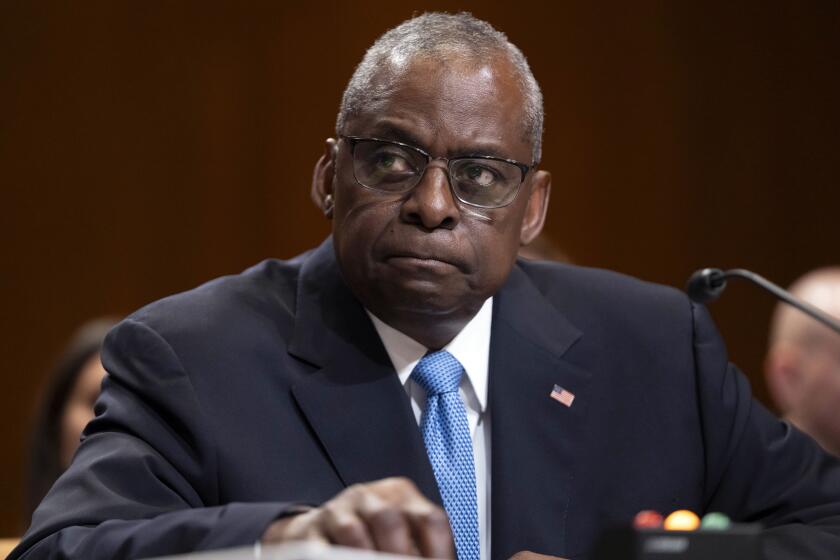Tensions Rise in Connecticut Primary Today : Outcome in Michigan Makes Stakes Higher for Both Dukakis, Jackson
In a state where the political mood was overwhelmingly apathetic only last week, pre-primary maneuvering became visibly more tense Monday after the surprisingly strong victory of the Rev. Jesse Jackson in the Michigan caucuses.
Although Massachusetts Gov. Michael S. Dukakis remained heavily favored in today’s Democratic primary here, his shaken supporters conceded that his dismal second-place showing in Michigan Saturday made it imperative that he win convincingly to regain lost momentum.
TV Advertising Doubled
In seeking to head off the Jackson onslaught, the Dukakis campaign Monday doubled its television advertising budget for Connecticut, buying more than $20,000 in new commercial time for a primary-eve media blitz.
Meanwhile, aides to Jackson, whose campaign last week appeared content to settle for a distant second-place finish here behind Dukakis, acknowledged Monday that, in the wake of his Michigan victory, Jackson had a chance to run far better, if not to win.
The state coordinator for Tennessee Sen. Albert Gore Jr., abandoning earlier talk of his candidate’s finishing ahead of Jackson, said Monday that Gore sought only to avoid coming in too far behind the front-runners. The Tennessee senator has spent more on television commercials here than any of his rivals but never followed through on a plan to campaign more heavily and seek an upset Northern victory.
52 Delegates at Stake
At stake in the Democratic primary are 52 of the state’s 63 delegates to the Democratic National Convention. Thirty-five delegates will be picked on the Republican side, with an overwhelming victory by Vice President George Bush taken for granted.
What will be crucial in determining the Democratic outcome today, the rival campaigns agreed, will be the size and distribution of voter turnout. That concern was reflected in the final campaign swings of all three candidates Sunday and Monday.
Dukakis, who is hoping to dilute Jackson’s highly committed urban base, sought to mobilize elderly and ethnic voters at events in the small cities along the Atlantic coast. Jackson, meanwhile, attracted thousands to rallies in the inner cities of Bridgeport, New Haven, Middletown and Hartford.
Gore, who would benefit most from a low turnout, according to his aides, maintained a lower profile while campaigning briefly in the affluent southern part of the state.
The only major poll taken in the state, a survey conducted by the University of Connecticut between March 9 and March 20, showed Dukakis leading Jackson by 50% to 16%, with Gore at only 3%, even with Illinois Sen. Paul Simon, who did not campaign here at all. Rep. Richard A. Gephardt, who dropped out of the race Monday, also did not campaign in the state and drew 1% support in the poll.
Close Race Held Possible
But neutral observers said Monday that they believe the poll underestimated Jackson’s strength even before his victory in Michigan. They said Jackson could run closely behind Dukakis, although none predicted that he would win.
“Michigan has to take its toll here,” said Toby Moffett, a former Connecticut congressman who now works as a television anchorman in Hartford.
“The gap is getting closer,” said Jonathan Pelto, a state legislator who is the Democratic Party’s political director, “but it would be hard to believe that it would close completely.”
Pelto was one of the few party leaders who remained neutral, not joining with Gov. William A. O’Neill and Sen. Christopher J. Dodd in endorsing the governor from the neighboring state.
The Dukakis campaign has sought to build turnout by making telephone calls to uncommitted voters and by distributing leaflets, although avoiding the inner-city areas where Jackson is strongest.
“The pattern has been that Jackson has 95% of the black vote,” Fred Jackson, Dukakis’ state coordinator, said, “so I don’t think we should encourage the blacks to get out and vote.”
But, on Monday, Jackson led about 75 new voters to registration tables in Middletown, as hundreds more, most of them black, waited for up to an hour to register at centers in New Haven and Hartford on the last day of voter registration before today’s primary.
State officials, one of whom attributed the outpouring of new voters to “the Jackson element,” said the long lines were unprecedented.
THE CONNECTICUT PRIMARY THE STATE
Population: 3,189,000 (1986 est.); 79% live in urban areas.
Racial/ethnic makeup: 90% white, 6% black, 3% Latino, 1% Asian.
Economy: diversified manufacturing, much of it defense-related; financial services, retail trade. Unemployment rate 3.2% (Jan. ‘88).
Major cities: Bridgeport, 142,000; Hartford (capital), 136,000; New Haven, 125,000. THE PRIMARY
At stake today are 52 Democratic and 35 Republican convention delegates. Both parties will allocate them to presidential candidates in proportion to the primary vote. Only registered Democrats (about 675,000) and Republicans (about 450,000) may vote in their respective primaries.
More to Read
Get the L.A. Times Politics newsletter
Deeply reported insights into legislation, politics and policy from Sacramento, Washington and beyond. In your inbox three times per week.
You may occasionally receive promotional content from the Los Angeles Times.






